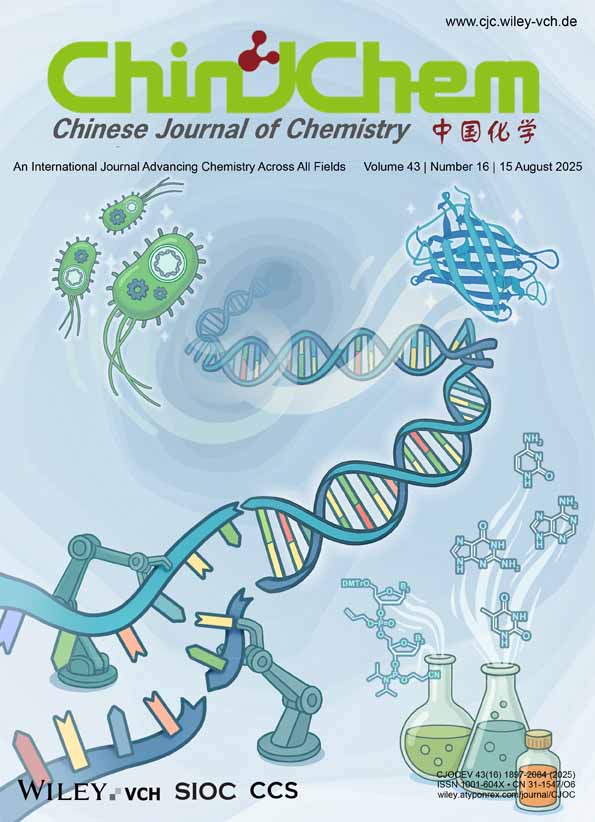Molecular Recognition of Bases and Nucleosides by Mono-substituted Mononuclear Complexes of 1, 4, 7, 10-Tetraaza-cyclododecane†
Qing-Xian Xiang
Department of Chemistry, Sichuan Key Laboratory of Green Chemistry and Technology, Sichuan University, Chengdu, Sichuan 610064, China
Search for more papers by this authorXiao-Qi Yu
Department of Chemistry, Sichuan Key Laboratory of Green Chemistry and Technology, Sichuan University, Chengdu, Sichuan 610064, China
Search for more papers by this authorJiang Wu
Department of Chemistry, Sichuan Key Laboratory of Green Chemistry and Technology, Sichuan University, Chengdu, Sichuan 610064, China
Search for more papers by this authorPei-Yan Liu
Department of Chemistry, Sichuan Key Laboratory of Green Chemistry and Technology, Sichuan University, Chengdu, Sichuan 610064, China
Search for more papers by this authorChuan-Qin Xia
Department of Chemistry, Sichuan Key Laboratory of Green Chemistry and Technology, Sichuan University, Chengdu, Sichuan 610064, China
Search for more papers by this authorRu-Gang Xie
Department of Environment and Life Science, Leshan Teachers College, Leshan, Sichuan 614004, China
Search for more papers by this authorQing-Xian Xiang
Department of Chemistry, Sichuan Key Laboratory of Green Chemistry and Technology, Sichuan University, Chengdu, Sichuan 610064, China
Search for more papers by this authorXiao-Qi Yu
Department of Chemistry, Sichuan Key Laboratory of Green Chemistry and Technology, Sichuan University, Chengdu, Sichuan 610064, China
Search for more papers by this authorJiang Wu
Department of Chemistry, Sichuan Key Laboratory of Green Chemistry and Technology, Sichuan University, Chengdu, Sichuan 610064, China
Search for more papers by this authorPei-Yan Liu
Department of Chemistry, Sichuan Key Laboratory of Green Chemistry and Technology, Sichuan University, Chengdu, Sichuan 610064, China
Search for more papers by this authorChuan-Qin Xia
Department of Chemistry, Sichuan Key Laboratory of Green Chemistry and Technology, Sichuan University, Chengdu, Sichuan 610064, China
Search for more papers by this authorRu-Gang Xie
Department of Environment and Life Science, Leshan Teachers College, Leshan, Sichuan 614004, China
Search for more papers by this authorDedicated to Professor ZHOU Wei-Shan on the occasion of his 80th birthday.
Abstract
The mononuclear macrocyclic polyamine metal complexes 5a—5e have been shown to form stable 1:1 complexes with bases and nucleosides. Their binding constants (K) were determined by UV-visible spectrometric titration. The results show that recognition ability of the complexes 5a—5e for uracil, U (Uridine), dT (Thymidine) is higher than that for the other bases or nucleosides (such as Cytidine, Guanosine, Adenosine). The metal ion also plays an important role for the recognition ability of complexes.
References
- 1(a) Balzani, V; De Cola, L. In, Supramolecular Chemistry, Kluwer Academic Publishers, The Netherlands, 1992, p. 137. (b) Steed, J. W.; Alwood, J. L. In, Supramolecular Chemistry, John Wiley & Sons Ltd. 2000, p. 13.
- 2 Dugas, H. In, Bioorganic chemistry, A chemical approach to enzyme action, Springer-Varlay, 3rd Ed., New York, Inc. 1996.
- 3 Kool, E. T., Chem. Rev. 1997, 97, 1473.
- 4 Xiang, Q.-X; You, J.-S; Liu, Y; Yu, X.-Q; Xie, R.-G., Chin. J. Org. Chem. 2001, 21, 557 (in Chinese).
- 5 Shionoya, M; Ikeda, F; Kimura, E; Shiro, M. J. Am. Chem. Soc. 1994, 116, 3848.
- 6 Kimura, E; Kitamura, H; Ohtani, K; Koike, T., J. Am. Chem. Soc. 2000, 722, 4668.
- 7 Aoki, S; Shiro, M; Koike, T; Kimura, E., J. Am. Chem. Soc. 2000, 112, 576.
- 8 Aoki, S; Kimura, E., J. Am. Chem. Soc. 2000, 112, 4542.
- 9 Ande, C; Llobet, A; Salvado, V., Inorg. Chem. 2000, 39, 3000.
- 10 Manfrin, M. F.; Maggi, L; Castelvtro, V; Balzani, V; Hosseini, M. W.; Lehn, J.-M., J. Am. Chem. Soc. 1985, 107, 6888.
- 11 Llobet, A; Reibenspies, J. H.; Martell, A. M., Inorg. Chem. 1994, 33, 5946.
- 12 Nation, D. A.; Reibenspies, J. H.; Martell, A. M., Inorg. Chem. 1996, 35, 4597.
- 13 Kioke, T; Inoue, M; Kimura, E; Shiro, M., J. Am. Chem. Soc. 1996, 118, 3091.
- 14 Luiz, M. T. B.; Szpoganicz, B; Rizzoto, M; Martell, A. M.; Basallote, M. G., Inorg. Chim. Acta 1997, 254, 345.
- 15 Nation, D. A.; Liu, Q; Martell, A. M., Inorg. Chim. Acta 1997, 263, 209.
- 16 You, J.-S; Yu, X.-Q; Zhang, G.-L; Xiang, Q.-X; Lan, J.-B; Xie, R.-G., Chem. Commun. 2001, 1816.
- 17
Lehn, J. M.
In, Supramolecular Chemistry, Concepts and Perspectives,
VCH, Verlagsgesellschaft,
1995.
10.1002/3527607439 Google Scholar
- 18 Chow, C. S.; Bogdan, F. M., Chem. Rev. 1997, 97, 1489.
- 19 Shionoya, M; Kimura, E; Shiro, M., J. Am. Chem. Soc. 1993, 115, 6730.
- 20 Shionoya, M; Ikeda, T; Kimura, E; Shiro, M., J. Am. Chem. Soc. 1994, 116, 3848.
- 21 Xiang, Q.-X; Zhou, H; Wang, X.-Y., Yu, X.-Q; Bao, J.-K; Xie, R.-G., Chin. Chem. Lett. 2002, 13, 223.
- 22 Xiang, Q.-X; Yu, X.-Q; Su, X.-Y; Wang, T; Yan, Q.-S; Xie, R.-G., J. Mol. Catal. Ax Chemical 2002, 187, 195.
- 23 Xiang, Q.-X; Yu, X.-Q; You, J.-S; Yan, Q.-S; Xie, R.-G., Chin. J. Chem. 2001, 19, 158.
- 24 Benesi, H; Hildebrand, J. H., J. Am. Chem. Soc. 1949, 71, 2703.
- 25 Gramer, F; Seanger, W; Spatz, H. C., J. Am. Chem. Soc. 1967, 89, 14.
- 26 Kikuta, E; Murata, M; Katsube, N; Koike, T; Kimura, E., J. Am. Chem. Soc. 1999, 121, 5426.
- 27 You, J.-S; Yu, X.-Q; Liu, K; Tao, L; Xiang, Q.-X; Xie, R.-G.;, Tetrahedron: Asmmetry 1999, 10, 243.
- 28 Kimura, E; Aoki, S; Koike, T; Shiro, M., J. Am. Chem. Soc. 1997, 119, 3068.




